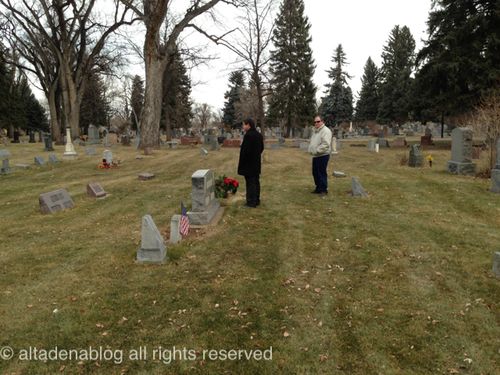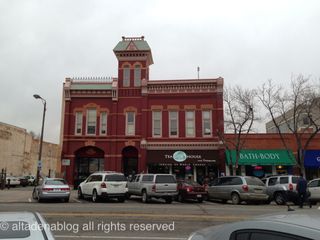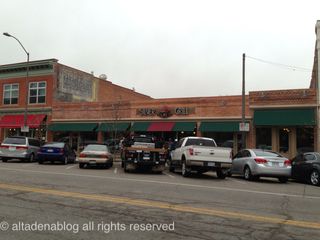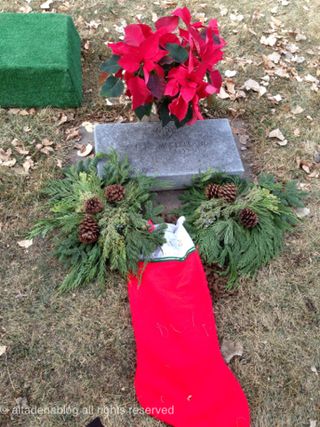
by Timothy Rutt
Last weekend, I went to bury my grandmother.
Mary Ellen Dixon McClelland Allen -- Ellen to all who knew her -- was born, lived, and died in Ft. Collins, Colorado, my ancestral home. She had three daughters (one died in early childhood), four grandsons, and five great-grandchildren. She outlived two husbands.
For over 30 years, she was a member of the Senior Harmonettes, a kazoo and drum band that entertained at local nursing homes. Senior Harmonettes join the band at age 65 or over. Nobody is a Senior Harmonette for three decades.
Except my grandmother -- when she died Dec. 7, she was 102 years old.
It’s amazing to be in your mid-50’s and still have a grandmother.
Deep roots
My maternal family came over from England, Scotland, and Ireland to settle the west. We have roots in the Greeley Colony, a utopian community that was started in Colorado and ended as all utopian communities do, but we stayed to farm, to become small merchants, and civil servants.
Most people see Colorado as a nothing but high mountains and ski resorts. But most of the state is flat prairie, and that’s where my people come from. We would no more go skiing than pearl diving.
I love my hometown, and like going to visit, although it’s not the same place where I grew up -- it has many more people and cars. The large fields outside of town that I remember are now houses and strip malls. But not all the changes are negative: Ft. Collins takes its bike paths seriously, and has a lot of them. Back when I grew up, many of the buildings in what we now call Old Town were covered by “modern” aluminum facades -- today, they’ve been stripped away to reveal their brick and brownstone Victorian-era beauty.
Ellen saw them in their splendor, their 60's-70's "modernization," and back again. Her life spanned William Howard Taft to Barack Obama. And she lived independently up until the last year and a half, when she moved to a nursing home. Her deterioration from kidney failure was rapid, but comfortable.

Her daughters -- my aunt and mother -- requested that I preside over her services several years ago. I have married and buried people in my earlier career, and my mother and aunt didn’t want someone who didn’t know Ellen to tell others about her life in the memorial service.
Because I believe so much in the power of stories (that’s why I do what I do), I thought it would be good to include many stories about her in the service. I also asked among members of my immediate family if they would share some stories as part of it. My two brothers who attended agreed. I didn’t want to open it up to anyone and everyone to speak -- I’ve been to some funerals where that happens, and it can be painful.
We interred her ashes privately in the morning -- me presiding, my mother, aunt, brothers, and the funeral director the only ones in attendence. We held the memorial service in the afternoon to a pretty full chapel. I spoke, my brothers spoke, and we played “Amazing Grace” to transition to the more religious part of the service.
During that hymn, as I was sitting down next to the pulpit, an agitated woman came up and took her place to speak. She whispered to me, “I’m a friend and I want to talk about Ellen.” I told her we weren’t doing that. “I want to talk about Ellen,” she repeated. I told her she needed to sit down because that time was passed -- but she was one of those people who hears but does not receive. After a few more exchanges -- when I wondered if I’d have to wrestle her to the ground, and how would THAT look? -- she realized she wasn’t making any inroads with me and took a seat in the pew, mumbling that I told her to “wait.” After the service, she gave my mother what looked like a handwritten manifesto and left. Something strange always happens. The service ended without further incident.The next day, I spent some time driving and walking around my old haunts in the town where I was born and spent the first 17 years of my life. My mother and aunt, after many years of living away from the place, moved back in recent years and live in senior housing. The ties are deep and strong there -- but they are breaking, fragmenting. The ties of family and friends in Southern California are stronger yet. It’s good to be back, but it was good to go home -- my real home, now.





